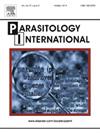Genetic diversity of Bartonella spp. in vampire bats and associated Streblidae bat flies in the Brazilian Amazon
IF 1.5
4区 医学
Q3 PARASITOLOGY
引用次数: 0
Abstract
Among mammals, bats stand out as important reservoirs for Bartonella spp., second only to rodents. In Brazil, out of the 182 species of bats described, three are hematophagous: Desmodus rotundus, Diphylla ecaudata and Diaemus youngii. Considering that Bartonella species have been increasingly associated to disease in humans, the search for such agents in animal reservoirs and ectoparasites is crucial for understanding the epidemiology of bartonelloses. The present study aimed to investigate the occurrence and genetic diversity of Bartonella spp. in vampire bats and Streblidae bat flies in the Brazilian Amazon. For this purpose, 228 spleen samples of D. rotundus and 1 of D. youngi were collected from four states in the northern region of Brazil (Pará (n = 206/D. rotundus; n = 1/D. youngii), Roraima (n = 18/ D. rotundus), Amapá (n = 3/D. rotundus) and Amazonas (n = 1/D. rotundus). Additionally, 142 Streblidae bat flies were collected from 54 D. rotundus (23 Strebla wiedemanni and 118 Trichobius parasiticus) and one D. youngii (1 Trichobius diaemi). Seventy-three (31.9 %; 73/228) spleen samples of D. rotundus (62 from Pará, 9 from Roraima and 2 from Amapá) and 45/142 (31.7 %) Streblidae bat flies (1 T. diaemi, 8 S. wiedemanni and 36 T. parasiticus) were positive in qPCR for Bartonella spp. based on the nuoG gene. Phylogenetic analyses based on the gltA and rpoB genes positioned the sequences obtained together with genotypes previously detected in D. rotundus and bat-associated flies. High genotypic diversity was found among sequences obtained from bats and Streblidae flies (6 gtlA and 11 rpoB genotypes). The genotypes identified in D. rotundus in the present study were exclusively shared with sequences from Bartonella spp. detected in vampire bats, not overlapping with genotypes previously detected in non-hematophagous bats from Brazil. Most of the sequences detected in Streblidae bat flies formed unique genotypes for each dipteran species analyzed. The present study expanded the knowledge regarding the diversity of Bartonella genotypes in vampire bats and associated Streblidae flies.
巴西亚马逊地区吸血蝙蝠及相关蝙蝠蝇中巴顿氏菌属的遗传多样性。
在哺乳动物中,蝙蝠是巴尔通体的重要宿主,仅次于啮齿动物。在巴西,在所描述的182种蝙蝠中,有三种是食血的:圆齿蝠、尾叶蝠和杨齿蝠。考虑到巴尔通体物种与人类疾病的关系日益密切,在动物宿主和体外寄生虫中寻找此类病原体对于了解巴尔通体的流行病学至关重要。本研究旨在调查巴西亚马逊地区吸血蝙蝠和链霉菌科蝙蝠蝇巴尔通体的发生及遗传多样性。为此,在巴西北部地区的4个州(par, n = 206/D)采集了圆形棘球绦虫228只脾脏标本和杨氏棘球绦虫1只脾脏标本。的例子;n = 1 / D。罗莱玛( = 18/ D. rotundus)、阿玛帕( = 3/D. rotundus)。(n = 1/D。的例子)。此外,还采集到142只链蝇,其中圆翅单胞菌54只(威德曼单胞菌23只,寄生毛滴虫118只),杨氏单胞菌1只( diaemi毛滴虫1只)。七十三(31.9 %;73/228)份圆形圆锥虫(para 62份,Roraima 9份,amap 2份)和Streblidae bat蝇45/142份(31.7% %)( T. 228)。diaemi 8 年代。wiedemanni和36 T。基于nuoG基因的巴尔通体qPCR检测结果均为阳性。基于gltA和rpoB基因的系统发育分析将获得的序列与先前在圆尾扁虱和蝙蝠相关蝇中检测到的基因型定位在一起。从蝙蝠和Streblidae flies获得的序列(6个gtlA和11个rpoB基因型)具有较高的基因型多样性。本研究中发现的圆形D.巴尔通体基因型与吸血蝙蝠中检测到的巴尔通体基因型完全相同,与先前在巴西非吸血蝙蝠中检测到的基因型不重叠。在Streblidae蝙蝠蝇中检测到的大多数序列在分析的每种双翅目物种中形成独特的基因型。本研究扩大了对吸血蝙蝠和相关链蝇巴尔通体基因型多样性的认识。
本文章由计算机程序翻译,如有差异,请以英文原文为准。
求助全文
约1分钟内获得全文
求助全文
来源期刊

Parasitology International
医学-寄生虫学
CiteScore
4.00
自引率
10.50%
发文量
140
审稿时长
61 days
期刊介绍:
Parasitology International provides a medium for rapid, carefully reviewed publications in the field of human and animal parasitology. Original papers, rapid communications, and original case reports from all geographical areas and covering all parasitological disciplines, including structure, immunology, cell biology, biochemistry, molecular biology, and systematics, may be submitted. Reviews on recent developments are invited regularly, but suggestions in this respect are welcome. Letters to the Editor commenting on any aspect of the Journal are also welcome.
 求助内容:
求助内容: 应助结果提醒方式:
应助结果提醒方式:


